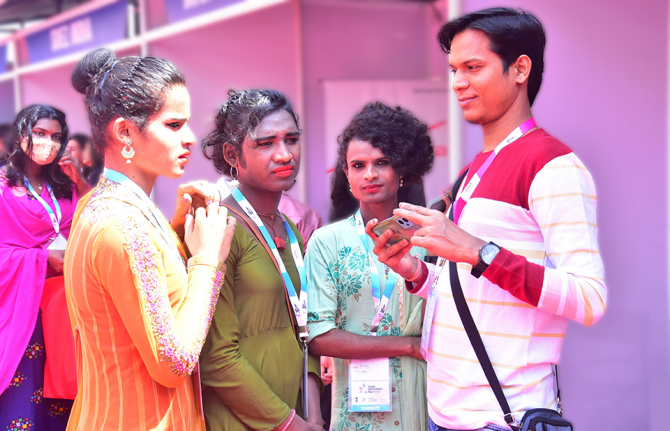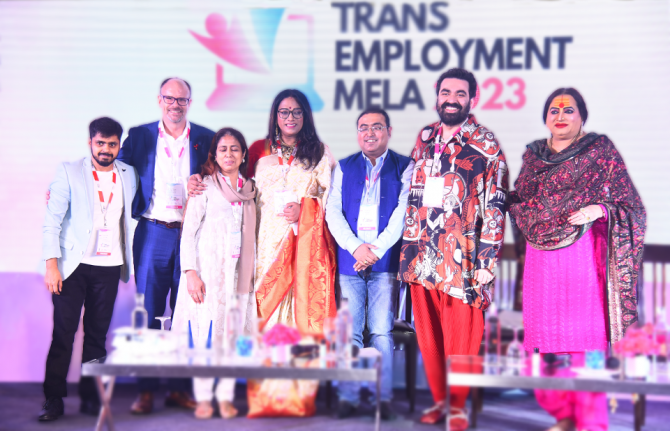



Feature Story
Beyond transgender visibility: India works toward employment equity
31 March 2023
31 March 2023 31 March 2023Ratrish Saha is a transgender woman from Kolkata, India. Even with seven years’ work experience, she was anxious about applying for a new job last year.
“Finding a job is never easy being a transgender woman. I would get rejected with statements like ‘currently no LGBT hiring is going on’ or ‘we do not have facilities to accommodate a trans individual in our office’,” she recalled. But through the Transgender Welfare Equity and Empowerment Trust or TWEET Foundation, she was paired with suitable opportunities in corporations that have received sensitivity training. She soon landed the position of associate consultant for Siemens Technology in Bangalore.
She said of the interview process: “I only talked about my skills and no gender explanations were included in those conversations.” An ecstatic Ms. Saha says she is “grabbing the opportunity… putting my all into it”.
Transgender people in India now have a new pathway toward dignified work thanks to a collaborative effort between communities, government and development partners.
Ahead of the International Day of Transgender Visibility, the UNAIDS Country Office for India and United Nations Development Programme (UNDP) supported the Trans Employment Mela (Job Fair) in New Delhi. The initiative was jointly hosted by the National Institute of Social Defence, Ministry of Social Justice and Empowerment, TWEET Foundation and In Harmony, a diversity consulting firm.
The programme aims to accelerate the socio-economic inclusion of the trans community by bringing awareness about their issues to mainstream corporations and providing a platform to connect them with job roles in inclusive organisations.
“Not only does this approach provide an opportunity for dialogue between government representatives, civil society organisations, and businesses, but it facilitates access to skills training, career counselling, entrepreneurship support and mentorship support,” Maya Awasthi, Co-Chair and Co-founder of TWEET Foundation explained.
India’s 2019 Transgender Persons (Protection of Rights) Act prohibits employment discrimination against trans people in either the public or private sectors. While stakeholders point to aspects of the law that could be strengthened, they acknowledge that the wide-ranging anti-discrimination provision creates a pathway toward building a more inclusive culture and pursuing redress when rights are violated.
Addressing employment access inequality is relevant to the HIV response. In 2021 HIV prevalence among transgender people in India was 3.8%, almost 20 times the national average. A study commissioned by India’s National Human Rights Commission found that in 2017 just six percent of transgender people were formally employed in either the private or non-governmental organisation (NGO) sector. About 5% engaged in sex work and domestic labour respectively. Thirteen percent sold food and other items while 11% reported begging.
“There are many ways in which higher paying and consistent work can reduce HIV vulnerability,” explained UNAIDS Country Director for India, David Bridger. “By addressing the inequalities that have unfairly pushed trans people away from opportunities, we can help build a more empowered community in which people fulfil their potential, enjoying better health and wellbeing in the process.”
The 2017 Human Rights Commission study found that around half the transgender population never attended school. Several development partners are supporting initiatives to provide the community with education opportunities in a stigma-free environment as well as skills training to promote self-reliance.
Aarav Singh is a transman who had been out of work for six months. He was able to score a human resource internship at Roop Automotives through the Trans Employment Mela.
“This is a sensitised, trans inclusive organisation where I've faced zero issues with documentation. Not only me but my friends have scored great opportunities with some of the leading trans inclusive companies,” he said. “I hope this continues.”
But while the Trans Employment Mela beneficiaries acknowledge the community dimension of their challenge, in other respects they feel like any other hopeful young professional or recent graduate.
Yumnam Thawalngamba Meetei completed an MBA in 2022 but found it difficult to get a management position “or even a small job”.
“With the help of TWEET Foundation I got into Mahindra Logistics Limited as an Executive for Talent Management and Organisational Development in Mumbai. I am thankful for this job to pave a path for my success,” he said.



